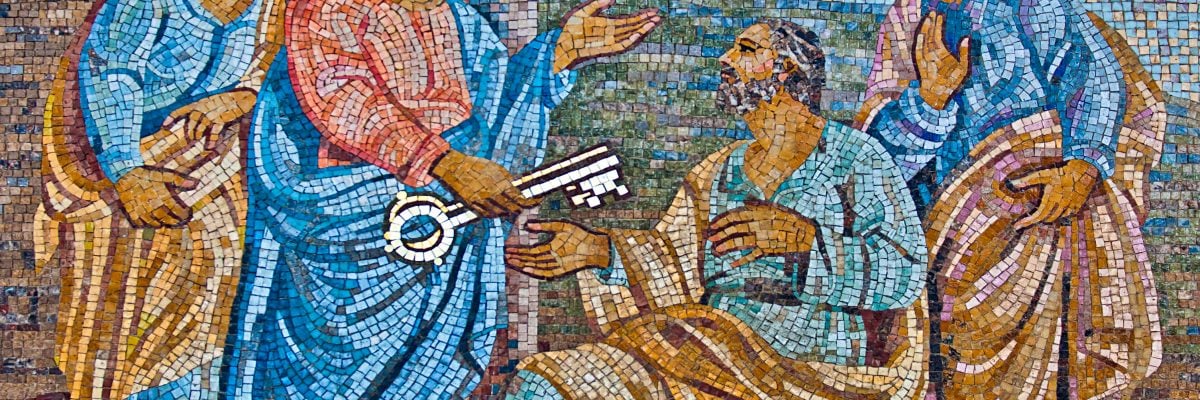
There are few dogmas of the Catholic Church that have appeared more scandalous to non-Catholic believers than papal infallibility. Consider, for example, this reflection from Protestant apologist Matt Slick in one of his critical pieces on the subject:
I can’t help but wonder what new revelations and infallible interpretations will arise within the Roman Catholic Church. Will the next six million years produce the complete deification of Mary? Will Mary become the creator of the universe in Roman Catholic lore? Or perhaps the pope might be elevated to a celestial level here on earth (Infallibility, Fallibility, and the Roman Catholic Church).
As any decently catechized Catholic will know, Slick can rest assured that neither Mary nor the pope will ever be the subjects of deification by the Catholic Church; not in the next sixty years, not in the next 600 billion years. Not ever. Indeed, papal infallibility exists to prevent such heresies. It is also fitting given the primary of the pope in the Church.
Papal Primacy
In St. Matthew’s Gospel, Jesus gives Peter alone “the keys to the kingdom of heaven” and the power to “bind and loose” (Matt. 16:16-20). Peter’s unique authority is powerfully exemplified in the Acts of the Apostles, at the Council of Jerusalem, when Peter made a definitive ruling regarding circumcision “and all the assembly kept silence” (Acts 15:12).
As the chief “overseer” of the Church, Peter—and his successors—was to maintain doctrinal purity, as well as doctrinal unity, in the Church. The eminent Protestant scholar James D.G. Dunn affirms this unitive role:
It is Peter who becomes the focal point of unity for the whole Church . . . he became the most hopeful symbol of unity for that growing Christianity which more and more came to think of itself as the Church Catholic” (Unity and Diversity in the New Testament, 386).
Writing in the second century, St. Irenaeus of Lyons gives important testimony to the primacy of the pope. Dealing with the Gnostic heretics in the second century, he asserted that the beliefs of every local Christian church must be congruent, not just with apostolic tradition, but with the teachings of every other Christian church. Why? Because the Church is essentially catholic. The primary way, wrote the ancient bishop of Lyons, that Christ ensures the unity of his Church is through the Petrine office: the church in Rome “is the greatest and most important and best-known of all . . . For with this church, because of her more powerful pre-eminence all churches must agree” (Against Heresies, III, 3.2) .
A Sensible Office
It makes sense that Jesus would establish such an authority in his absence—something like the Petrine office—because “the heart is deceitful above all things” (Jer. 17:9). We are easily fooled and distracted, and thereby often fail to hear the still, small voice of God. Yes, the Holy Spirit can and will lead us into all truth as Jesus promised—but how, exactly? Through prayer and contemplation of the scriptures, surely. But as St. Paul tells us, we are to “test everything [and] hold fast to what is good” (1 Thess. 5:21). How should we test and confirm our spiritual sentiments? Through the infallible guidance of the Church, especially realized in the ministry of the chief bishop of the Church.
Papal infallibility is often misunderstood, but not because it is a hard concept to understand. It makes perfect sense. We need an infallible teaching authority because we are so fallible.
And because this charism exists to prevent the teaching of error in the universal Church, it is only present when the pope fulfills three narrow criteria. First, he must be teaching as the supreme pastor of the universal church. Second, he must have the intention of deciding a matter finally. Third, the teaching must be regarding faith and morals.
Assisted, Not Inspired
The writers of the New Testament were also specially influenced by God as they communicated religious truth. But there’s a critical distinction to be made here. The New Testament writers were not merely influenced—they were inspired. Indeed they were inspired in such a profound manner that, although it was mere creatures who put letters to the sacred page, God was in fact the primary author. Catholic theologian Ludwig Ott affirms this distinction in his well-known Fundamentals of Catholic Dogma:
This assistance [involved in papal infallibility] must be distinguished . . . from Inspiration, which is a positive influence effected by God over an author, of such a nature that God himself is the principal author of the writing, and the ideas are consequently the Word of God.
Whereas inspiration is a positive influence to “write only what God wants written,” papal infallibility is essentially a negative—or preventative—charism that prevents the chief teacher of the Church from teaching “what God does not want taught,” that is, from teaching error.
Peter the Pitiful
Given his blunderous and impulsive character, wasn’t the apostle Peter rather unfit for the job as infallible leader of the Church? What about his successors? Precisely so—at least according to worldly standards. By gospel standards, however, Peter was the perfect fit.
Truly at the crux of the Good News is the paradoxical truth that God “has put down the mighty from their thrones, and exalted those of low degree” (Luke 1:52). Jesus specializes in making something great out the pitiful. Indeed during his earthly ministry he took a special interest in uneducated fishermen, sinful tax collectors—even murderers like Paul—many of whom he gave the task of overseeing his ministry and tending his flock.
Riddled as he was with imperfections, the genius of Peter’s selection may not have been immediately apparent. Centuries later, however, the power of God is clear. For the Chair of Peter still remains; no power has yet prevailed over the Church. “All the empires and the kingdoms have failed, because of this inherent and continual weakness, that they were founded by strong men and upon strong men,” writes Chesterton. “But this one thing, the historic Christian Church, was founded on a weak man, and for that reason it is indestructible. For no chain is stronger than its weakest link” (Heretics). Indeed, when Jesus gave Peter the keys and charism of infallibility, he infused the whole Christian people with a principle of unity that forms an unbreakable bond.
Peter’s Faith Did Not Fail
“The prayer of a righteous man is great in its effect,” writes St. James (James 5:16). How great in its effect must have been the Lord’s prayer for Peter when he said to his chief disciple, “I have prayed for you that your faith may not fail; and when you have turned again, strengthen your brethren” (Luke 22:32).
Indeed, from that perfect prayer of Christ have come two miracles that have strengthened the Church ever since. The first is the witness—the martyrdom—of Peter whose faith did not fail in the end. And the second is still with us; indeed we are living it—the indestructible Catholic Church, the community of believers in grace whose faith has been strengthened century after century by the Servant of the Servants of God, the pope.



